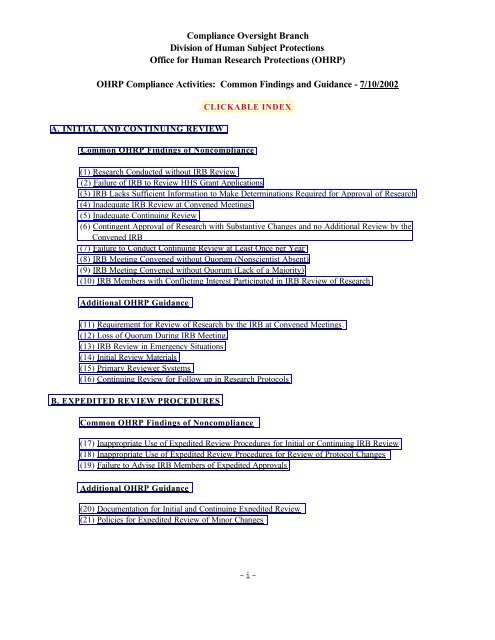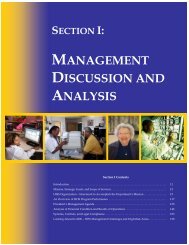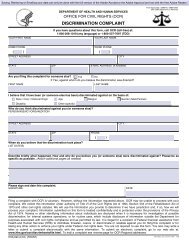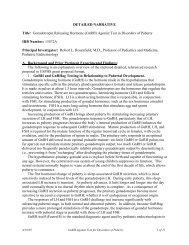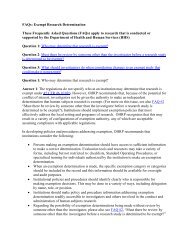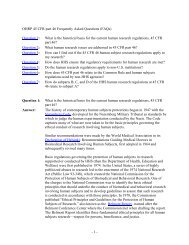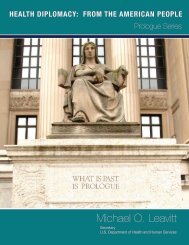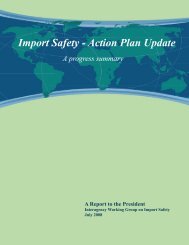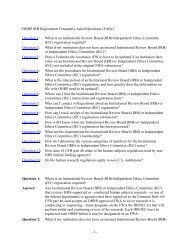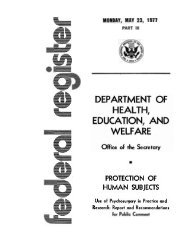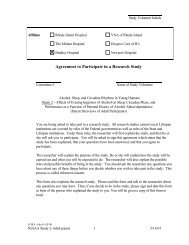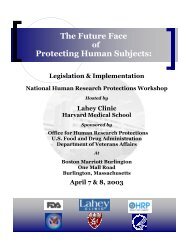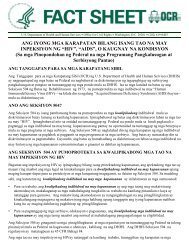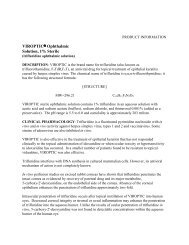OHRP Compliance Oversight Common Findings - HHS Archive
OHRP Compliance Oversight Common Findings - HHS Archive
OHRP Compliance Oversight Common Findings - HHS Archive
You also want an ePaper? Increase the reach of your titles
YUMPU automatically turns print PDFs into web optimized ePapers that Google loves.
<strong>Compliance</strong> <strong>Oversight</strong> Branch<br />
Division of Human Subject Protections<br />
Office for Human Research Protections (<strong>OHRP</strong>)<br />
<strong>OHRP</strong> <strong>Compliance</strong> Activities: <strong>Common</strong> <strong>Findings</strong> and Guidance - 7/10/2002<br />
A. INITIAL AND CONTINUING REVIEW<br />
CLICKABLE INDEX<br />
<strong>Common</strong> <strong>OHRP</strong> <strong>Findings</strong> of Noncompliance<br />
(1) Research Conducted without IRB Review<br />
(2) Failure of IRB to Review <strong>HHS</strong> Grant Applications<br />
(3) IRB Lacks Sufficient Information to Make Determinations Required for Approval of Research<br />
(4) Inadequate IRB Review at Convened Meetings<br />
(5) Inadequate Continuing Review<br />
(6) Contingent Approval of Research with Substantive Changes and no Additional Review by the<br />
Convened IRB<br />
(7) Failure to Conduct Continuing Review at Least Once per Year<br />
(8) IRB Meeting Convened without Quorum (Nonscientist Absent)<br />
(9) IRB Meeting Convened without Quorum (Lack of a Majority)<br />
(10) IRB Members with Conflicting Interest Participated in IRB Review of Research<br />
Additional <strong>OHRP</strong> Guidance<br />
(11) Requirement for Review of Research by the IRB at Convened Meetings.<br />
(12) Loss of Quorum During IRB Meeting.<br />
(13) IRB Review in Emergency Situations<br />
(14) Initial Review Materials<br />
(15) Primary Reviewer Systems<br />
(16) Continuing Review for Follow up in Research Protocols<br />
B. EXPEDITED REVIEW PROCEDURES<br />
<strong>Common</strong> <strong>OHRP</strong> <strong>Findings</strong> of Noncompliance<br />
(17) Inappropriate Use of Expedited Review Procedures for Initial or Continuing IRB Review<br />
(18) Inappropriate Use of Expedited Review Procedures for Review of Protocol Changes<br />
(19) Failure to Advise IRB Members of Expedited Approvals<br />
Additional <strong>OHRP</strong> Guidance<br />
(20) Documentation for Initial and Continuing Expedited Review<br />
(21) Policies for Expedited Review of Minor Changes<br />
-i-
C. REPORTING OF UNANTICIPATED PROBLEMS AND IRB REVIEW OF PROTOCOL<br />
CHANGES<br />
<strong>Common</strong> <strong>OHRP</strong> <strong>Findings</strong> of Noncompliance<br />
(22) Failure to Report Unanticipated Problems to IRB, Institutional Officials, and <strong>OHRP</strong><br />
(23) Failure of IRB to Review Protocol Changes<br />
(24) Inadequate IRB Review of Protocol Changes<br />
Additional <strong>OHRP</strong> Guidance<br />
(25) Requirement for Review of Proposed Protocol Changes by the IRB at Convened Meetings.<br />
D. APPLICATION OF EXEMPTIONS<br />
<strong>Common</strong> <strong>OHRP</strong> <strong>Findings</strong> of Noncompliance<br />
(26) Inappropriate Application of Exempt Categories of Research<br />
(27) Inappropriate Application of Exemption 4<br />
Additional <strong>OHRP</strong> Guidance<br />
(28) Procedures for Determining Exemptions<br />
(29) Applicability of Exemption 2 for Research Involving Children<br />
(30) Applicability of Exemption 5 for “Public Benefit” Projects<br />
E. INFORMED CONSENT<br />
<strong>Common</strong> <strong>OHRP</strong> <strong>Findings</strong> of Noncompliance<br />
(31) Failure to Obtain Legally Effective Informed Consent<br />
(32) Failure to Document Informed Consent<br />
(33) Deficient Informed Consent Documents (ICDs) in General<br />
(34) Inadequate ICD for Specific Research/Lack of Required Elements<br />
(35) Inadequate ICD for Specific Research/Lack of Additional Elements<br />
(36) ICD Language too Complex<br />
(37) Exculpatory Language in ICDs<br />
(38) Standard Surgical Consent Documents Lack Required Elements of Informed Consent<br />
(39) Inappropriate Boiler Plate ICDs<br />
(40) Enrollment Procedures did not Minimize Possibility of Coercion or Undue Influence<br />
Additional <strong>OHRP</strong> Guidance<br />
(41) Informed Consent for Research in Emergency Situations<br />
(42) Approval and Expiration Dates on Informed Consent Documents<br />
(43) IRB Review of NIH-Approved Informed Consent Documents for NIH-Supported Multicenter<br />
Clinical Trials<br />
(44) Description of Notification of HIV Testing Results<br />
(45) Documentation of Informed Consent for Non-English Speakers<br />
-ii-
F. IRB MEMBERSHIP, EXPERTISE, STAFF, SUPPORT, AND WORKLOAD<br />
<strong>Common</strong> <strong>OHRP</strong> <strong>Findings</strong> of Noncompliance<br />
(46) Lack of Diversity of IRB Membership<br />
(47) Lack of IRB Expertise Regarding Research Involving Children<br />
(48) Lack of Prisoner/Prisoner Representative for IRB Review of Research Involving Prisoners<br />
(49) Conflict Resulting from Office of Research Support (Sponsored Programs) Serving as a Voting<br />
Member of the IRB<br />
(50) IRB Chair and Members Lack Sufficient Understanding of <strong>HHS</strong> Regulations<br />
(51) Designation of an Additional IRB under an MPA without Prior <strong>OHRP</strong> Approval<br />
(52) Inadequate IRB Resources<br />
(53) Overburdened IRB<br />
Additional <strong>OHRP</strong> Guidance<br />
(54) IRB Knowledge of Local Research Context<br />
G. DOCUMENTATION OF IRB ACTIVITIES, FINDINGS, AND PROCEDURES<br />
<strong>Common</strong> <strong>OHRP</strong> <strong>Findings</strong> of Noncompliance<br />
(55) Inadequate IRB Records<br />
(56) Inadequate IRB Minutes<br />
(57) Poorly Maintained IRB Files<br />
(58) Failure of IRB to Determine That Criteria for IRB Approval Are Satisfied<br />
(59) Failure of IRB to Document Consideration of Additional Safeguards for Vulnerable Subjects<br />
(60) Failure of IRB to Make Required <strong>Findings</strong> When Reviewing Research Involving Children<br />
(61) Failure of IRB to Make Required <strong>Findings</strong> When Reviewing Research Involving Prisoners<br />
(62) Failure of IRB to Make and Document Required <strong>Findings</strong> for Waiver of Informed Consent<br />
(63) Failure to Make Required <strong>Findings</strong> for IRB Waiver of a Signed Informed Consent Document<br />
(64) Lack of Appropriate Written IRB Policies and Procedures<br />
(65) Inadequate Procedures for <strong>Oversight</strong> of Repository Activities<br />
(66) Inadequate Procedure for Reporting and Review of Unanticipated Problems <br />
Additional <strong>OHRP</strong> Guidance<br />
(67) Retention of IRB Records<br />
(68) Recording of Votes in IRB Minutes<br />
(69) Documentation of Required IRB <strong>Findings</strong> in IRB Minutes<br />
(70) Documentation of Risk and Approval Period in IRB Minutes<br />
(71) IRB Policies and Procedures– Operational Details<br />
(72) Handbook of IRB Guidelines and Procedures for Investigators<br />
-iii-
H. MISCELLANEOUS <strong>OHRP</strong> GUIDANCE<br />
(73) Protocol Revisions - Incorporation Into Written Protocol<br />
(74) Operation of Student “Human Subject Pools”<br />
(75) Procedures for Control of Investigational Agents<br />
(76) Applicability of State and Local Laws to <strong>HHS</strong>-Supported Research<br />
(77) Fetal Tissue Transplantation Research<br />
-iv-
A. INITIAL AND CONTINUING REVIEW<br />
<strong>Common</strong> <strong>OHRP</strong> <strong>Findings</strong> of Noncompliance<br />
(1) Research Conducted without IRB Review. In accordance with <strong>HHS</strong> regulations at 45 CFR<br />
46.103(b) and 46.109(a), the IRB must review and approve all non-exempt human subject research<br />
covered by an assurance. <strong>OHRP</strong> found that certain human subject research was conducted without<br />
IRB review.<br />
(2) Failure of IRB to Review <strong>HHS</strong> Grant Applications. <strong>HHS</strong> regulations at 45 CFR 46.103(f) require<br />
that an institution with an approved assurance shall certify that each application or proposal for<br />
research covered by the assurance has been reviewed and approved by the IRB.<br />
(a) <strong>OHRP</strong> found numerous discrepancies between the title, date, and type of IRB approval<br />
reported on the face page of grant applications and the relevant documentation in IRB records.<br />
(b) In reviewing IRB records, and in discussions with IRB members, IRB administrators, and<br />
research investigators, <strong>OHRP</strong> finds that the IRB consistently fails to review the grant application<br />
for proposed research.<br />
(3) IRB Lacks Sufficient Information to Make Determinations Required for Approval of Research.<br />
<strong>OHRP</strong> is concerned that when reviewing protocol applications, the IRB often appears to lack sufficient<br />
information to make the determinations required for approval of research under <strong>HHS</strong> regulations at 45<br />
CFR 46.111. For example, the IRB appears to review only minimal information regarding (a) subject<br />
recruitment and enrollment procedures; (b) the equitable selection of subjects; (c) provisions to protect<br />
the privacy of subjects and maintain the confidentiality of data; and (d) additional safeguards to protect<br />
the rights and welfare of subjects who are likely to be vulnerable.<br />
(4) Inadequate IRB Review at Convened Meetings. The minutes of IRB meetings, and our discussions<br />
with IRB members and administrators, indicate that little substantive review takes place at convened<br />
meetings. Most protocols undergoing [initial/continuing] review are neither individually presented nor<br />
discussed at a convened meeting by the IRB as a group. Furthermore, <strong>OHRP</strong>’s inspection of available<br />
materials yielded scant evidence that IRB approval of research is consistently based on consideration of<br />
the determinations required under <strong>HHS</strong> regulations at 45 CFR 46.111. In specific, the IRB appears<br />
not to consider systematically and rigorously such issues as equitable selection of subjects and subject<br />
recruitment, privacy and confidentiality protections, and special protections required for vulnerable<br />
subjects.<br />
(5) Inadequate Continuing Review. Continuing review of research must be substantive and<br />
meaningful. <strong>HHS</strong> regulations at 45 CFR 46.111 set forth the criteria that must be satisfied in order for<br />
the IRB to approve research. These criteria include, among other things, determinations by the IRB<br />
<strong>OHRP</strong> <strong>Compliance</strong> Activities: <strong>Common</strong> <strong>Findings</strong> and Guidance (7/10/2002)<br />
Page 1 of 20
egarding risks, potential benefits, informed consent, and safeguards for human subjects. The IRB must<br />
ensure that these criteria are satisfied at the time of both initial and continuing review. The procedures<br />
for continuing review by the convened IRB may include a primary reviewer system.<br />
In conducting continuing review of research not eligible for expedited review, all IRB members should<br />
at least receive and review a protocol summary and a status report on the progress of the research,<br />
including: (i) the number of subjects accrued; (ii) a summary of adverse events and any unanticipated<br />
problems involving risks to subjects or others and any withdrawal of subjects from the research or<br />
complaints about the research since the last IRB review; (iii) a summary of any relevant recent literature,<br />
interim findings, and amendments or modifications to the research since the last review; (iv) any relevant<br />
multi-center trial reports; (v) any other relevant information, especially information about risks<br />
associated with the research; and (vi) a copy of the current informed consent document and any newly<br />
proposed consent document.<br />
At least one member of the IRB (i.e., a primary reviewer) also should receive a copy of the complete<br />
protocol including any modifications previously approved by the IRB. Furthermore, upon request, any<br />
IRB member also should have access to the complete IRB protocol file and relevant IRB minutes prior<br />
to or during the convened IRB meeting. The minutes of IRB meetings should document separate<br />
deliberations, actions, and votes for each protocol undergoing continuing review by the convened IRB.<br />
When reviewing research under an expedited review procedure, the IRB Chair (or designated IRB<br />
member(s)) should receive and review all of the above-referenced documentation, including the<br />
complete protocol.<br />
<strong>OHRP</strong> finds that continuing review of research by the IRB was not substantive and meaningful.<br />
(6) Contingent Approval of Research with Substantive Changes and no Additional Review by the<br />
Convened IRB. <strong>OHRP</strong> finds that the IRB frequently approves research contingent upon substantive<br />
modifications or clarifications without requiring additional review by the convened IRB. <strong>OHRP</strong><br />
recommends the following guidelines in such cases: (a) When the convened IRB requests substantive<br />
clarifications or modifications regarding the protocol or informed consent documents that are directly<br />
relevant to the determinations required by the IRB under <strong>HHS</strong> regulations at 45 CFR 46.111, IRB<br />
approval of the proposed research should be deferred, pending subsequent review by the convened<br />
IRB of responsive material. (b) Only when the convened IRB stipulates specific revisions requiring<br />
simple concurrence by the investigator may the IRB Chair or another IRB member designated by the<br />
Chair subsequently approve the revised research protocol on behalf of the IRB under an expedited<br />
review procedure.<br />
(7) Failure to Conduct Continuing Review at Least Once per Year. <strong>HHS</strong> regulations at 45 CFR<br />
46.109(e) require that continuing review of research be conducted by the IRB at intervals appropriate<br />
to the degree of risk and not less than once per year. The regulations make no provision for any grace<br />
<strong>OHRP</strong> <strong>Compliance</strong> Activities: <strong>Common</strong> <strong>Findings</strong> and Guidance (7/10/2002)<br />
Page 2 of 20
period extending the conduct of the research beyond the expiration date of IRB approval. Additionally,<br />
where the convened IRB specifies conditions for approval of a protocol that are to be verified as being<br />
satisfied by the IRB Chair or another IRB member designated by the Chair, continuing review must<br />
occur no more than one year after the date the protocol was reviewed by the convened IRB, not on the<br />
anniversary of the date the IRB Chair or his or her designee verifies that IRB-specified conditions for<br />
approval have been satisfied. <br />
<strong>OHRP</strong> found numerous instances in which {extensions beyond the expiration date were granted} OR<br />
{the IRB failed to conduct continuing review of research at least once per year}. <br />
The IRB and investigators must plan ahead to meet required continuing review dates. If an investigator<br />
has failed to provide continuing review information to the IRB or the IRB has not reviewed and<br />
approved a research study by the continuing review date specified by the IRB, the research must stop,<br />
unless the IRB finds that it is in the best interests of individual subjects to continue participating in the<br />
research interventions or interactions. Enrollment of new subjects cannot occur after the expiration of<br />
IRB approval. <br />
(8) IRB Meeting Convened without Quorum (Nonscientist Absent). <strong>HHS</strong> regulations at 45 CFR<br />
46.108(b) require that, except when an expedited review procedure is used, research be reviewed at<br />
convened meetings at which a majority of the members of the IRB are present, including at least one<br />
member whose primary concerns are in a nonscientific area. <strong>OHRP</strong> finds that the [date] IRB meeting<br />
did not include a nonscientist member. Thus, any actions taken at this meeting must be considered<br />
invalid. <strong>OHRP</strong> emphasizes that when no nonscientist member is present during the course of the<br />
meeting, the IRB may not take further actions or votes until a nonscientist member returns. <br />
(9) IRB Meeting Convened without Quorum (Lack of a Majority). <strong>HHS</strong> regulations at 45 CFR<br />
46.108 require that, except when an expedited review procedure is used, the IRB review proposed<br />
research at convened meetings at which a majority of the members of the IRB are present. <strong>OHRP</strong><br />
found that the IRB failed to meet this requirement for the following IRB meetings: [date], X members<br />
present. Thus, any actions taken at these meeting must be considered invalid. <strong>OHRP</strong> emphasizes that<br />
should the quorum fail during a meeting (e.g., those with conflicts being excused, early departures,<br />
absence of a nonscientist member), the IRB may not take further actions or votes unless the quorum<br />
can be restored.<br />
(10) IRB Members with Conflicting Interest Participated in IRB Review of Research. <strong>HHS</strong> regulations<br />
at 45 CFR 46.107(e) stipulate that no IRB member may participate in the IRB’s initial or continuing<br />
review of a project in which the member has a conflicting interest, except to provide information<br />
requested by the IRB. <strong>OHRP</strong> found instances in which IRB members inappropriately participated in<br />
the initial and continuing review of protocols for which they had a conflicting interest. <strong>OHRP</strong><br />
recommends that except when requested by the IRB to be present to provide information, IRB<br />
members absent themselves from the meeting room when the IRB reviews research in which they have<br />
a conflicting interest, and such should be noted in the IRB meeting minutes.<br />
<strong>OHRP</strong> <strong>Compliance</strong> Activities: <strong>Common</strong> <strong>Findings</strong> and Guidance (7/10/2002)<br />
Page 3 of 20
Additional <strong>OHRP</strong> Guidance<br />
(11) Requirement for Review of Research by the IRB at Convened Meetings. In accordance with<br />
<strong>HHS</strong> regulations at 45 CFR 46.108(b), initial and continuing reviews of research must be conducted by<br />
the IRB at convened meetings at which a majority of the members of the IRB are present, including at<br />
least one member whose primary concerns are in nonscientific areas (i.e., a quorum), except where<br />
expedited review is appropriate under <strong>HHS</strong> regulations at 45 CFR 46.110(b)(1) for the categories of<br />
research listed in the Federal Register of November 9, 1998 (see 63 FR 60364-60367 at<br />
http://ohrp.osophs.dhhs.gov/humansubjects/guidance/expedited98.htm). Approval of research is by a<br />
majority vote of this quorum.<br />
(12) Loss of Quorum During IRB Meeting. A quorum for IRB meetings is a majority of the IRB's<br />
voting members, including at least one member whose primary interests are in nonscientific areas (see<br />
45 CFR 46.108(b)). Approval of research is by majority vote of those present. Should the quorum<br />
fail during a meeting (e.g., loss of a majority through recusal of members with conflicting interests or<br />
early departures, or absence of a nonscientist member), the IRB may not take further actions or votes<br />
unless the quorum can be restored.<br />
(13) IRB Review in Emergency Situations. <strong>HHS</strong> regulations do not permit human subject research<br />
activities to be started, even in an emergency, without prior IRB review and approval (see<br />
45 CFR 46.103(b) and 46.116(f) and <strong>OHRP</strong> guidance at<br />
http://ohrp.osophs.dhhs.gov/humansubjects/guidance/hsdc91-01.htm). When emergency medical care<br />
is initiated without prior IRB review and approval, the patient may not be considered a research subject<br />
under 45 CFR Part 46. Such emergency care may not be claimed as research, nor may any data<br />
regarding such care be included in any report of a prospectively conceived research activity. When<br />
emergency care involves investigational drugs, devices, or biologics, U.S. Food and Drug<br />
Administration (FDA) requirements must be satisfied.<br />
(14) Initial Review Materials. In conducting the initial review of proposed research, IRBs must obtain<br />
information in sufficient detail to make the determinations required under <strong>HHS</strong> regulations at<br />
45 CFR 46.111. Materials should include the full protocol, a proposed informed consent document,<br />
any relevant grant application(s), the investigator's brochure (if one exists), and any recruitment<br />
materials, including advertisements intended to be seen or heard by potential subjects. Furthermore, for<br />
<strong>HHS</strong>-supported multicenter clinical trials, the IRB should receive and review a copy of the <strong>HHS</strong>approved<br />
sample informed consent document and the complete <strong>HHS</strong>-approved protocol, if they exist.<br />
Unless a primary reviewer system is used, all members should receive a copy of the complete<br />
documentation. These materials should be received by members sufficiently in advance of the meeting<br />
date to allow review of this material.<br />
(15) Primary Reviewer Systems. If the IRB uses a primary reviewer system, the primary reviewer(s)<br />
should do an in-depth review of all pertinent documentation (see previous paragraph). All other IRB<br />
<strong>OHRP</strong> <strong>Compliance</strong> Activities: <strong>Common</strong> <strong>Findings</strong> and Guidance (7/10/2002)<br />
Page 4 of 20
members should at least receive and review a protocol summary (of sufficient detail to make the<br />
determinations required under <strong>HHS</strong> regulations at 45 CFR 46.111), the proposed informed consent<br />
document, and any recruitment materials, including advertisements intended to be seen or heard by<br />
potential subjects. In addition, the complete documentation should be available to all members for<br />
review.<br />
(16) Continuing Review for Follow up in Research Protocols. For research where (i) the research is<br />
permanently closed to the enrollment of new subjects; (ii) all subjects have completed all<br />
research-related interventions, continuing IRB review is required as long as the research remains active<br />
only for long-term follow-up of subjects. Furthermore, continuing IRB review of research is required<br />
where the remaining research activities are limited to data analysis (see 63 FR 60364-60367, category<br />
(8)).<br />
B. EXPEDITED REVIEW PROCEDURES<br />
<strong>Common</strong> <strong>OHRP</strong> <strong>Findings</strong> of Noncompliance<br />
(17) Inappropriate Use of Expedited Review Procedures for Initial or Continuing IRB Review. <strong>HHS</strong><br />
regulations at 45 CFR 46.110(b)(1) limit the use of expedited review procedures to specific research<br />
categories published in the Federal Register at 63 FR 60364--60367. <strong>OHRP</strong> finds that:<br />
(a) The IRB inappropriately applies expedited review to research that involves minimal risk but<br />
does not appear in the categories of research published in the Federal Register.<br />
(b) The IRB inappropriately applies expedited review to research that involves greater than minimal<br />
risk.<br />
(18) Inappropriate Use of Expedited Review Procedures for Review of Protocol Changes. <strong>HHS</strong><br />
regulations at 45 CFR 46.110(b)(2) permit use of expedited procedures for review of minor changes to<br />
previously approved research during the period for which approval is authorized. <strong>OHRP</strong> finds that the<br />
IRB has employed expedited procedures to review changes that exceed this limitation.<br />
(19) Failure to Advise IRB Members of Expedited Approvals. <strong>OHRP</strong> finds that IRB members were<br />
not advised of (a) research protocols approved at time of initial or continuing review under an<br />
expedited review procedure, or (b) minor changes in research protocols approved under an expedited<br />
review procedure, as required by <strong>HHS</strong> regulations at 45 CFR 46.110(c).<br />
<strong>OHRP</strong> <strong>Compliance</strong> Activities: <strong>Common</strong> <strong>Findings</strong> and Guidance (7/10/2002)<br />
Page 5 of 20
Additional <strong>OHRP</strong> Guidance<br />
(20) Documentation for Initial and Continuing Expedited Review. <strong>OHRP</strong> recommends that<br />
documentation for initial and continuing reviews conducted under an expedited review procedure<br />
include: (a) the specific permissible categories (see 63 FR 60364-60367 at<br />
http://ohrp.osophs.dhhs.gov/humansubjects/guidance/expedited98.htm) justifying the expedited review;<br />
and (b) documentation of the review and action taken by the IRB chairperson or designated reviewer<br />
and any findings required under the <strong>HHS</strong> regulations.<br />
(21) Policies for Expedited Review of Minor Changes. <strong>OHRP</strong> recommends that institutions adopt<br />
policies describing the types of minor changes in previously approved research which can be approved<br />
by expedited review in accordance with <strong>HHS</strong> regulations at 45 CFR 46.110(b)(2).<br />
C. REPORTING OF UNANTICIPATED PROBLEMS AND IRB REVIEW OF<br />
PROTOCOL CHANGES<br />
<strong>Common</strong> <strong>OHRP</strong> <strong>Findings</strong> of Noncompliance<br />
(22) Failure to Report Unanticipated Problems to IRB, Institutional Officials, and <strong>OHRP</strong>. <strong>OHRP</strong> finds<br />
that the following unanticipated problems involving risks to subjects or others were not reported to<br />
[appropriate institutional officials/the IRB/<strong>OHRP</strong>/the head of the sponsoring Federal department or<br />
agency] as required by <strong>HHS</strong> regulations at 45 CFR 46.103(a) and 46.103(b)(5):<br />
(23) Failure of IRB to Review Protocol Changes. <strong>HHS</strong> regulations at 45 CFR 46.103(b)(4)(iii)<br />
require that the IRB review and approve all proposed changes in a research activity, during the period<br />
for which IRB approval has already been given, prior to initiation of such changes, except when<br />
necessary to eliminate apparent immediate hazards to the subjects. <strong>OHRP</strong> finds {no documentation<br />
that the IRB reviewed and approved the following protocol changes prior to their initiation:}OR {that<br />
the following protocol changes were implemented without IRB approval:}<br />
(24) Inadequate IRB Review of Protocol Changes. <strong>OHRP</strong> is concerned about the adequacy of the<br />
IRB’s procedure for reviewing protocol modifications. In some cases, the IRB Chair or designated<br />
IRB reviewer approved such modifications in the absence of a complete description of the proposed<br />
changes.<br />
Additional <strong>OHRP</strong> Guidance<br />
(25) Requirement for Review of Proposed Protocol Changes by the IRB at Convened Meetings. In<br />
accordance with <strong>HHS</strong> regulations at 45 CFR 46.108(b), review of proposed protocol changes must be<br />
conducted by the IRB at convened meetings at which a majority of the members of the IRB are<br />
<strong>OHRP</strong> <strong>Compliance</strong> Activities: <strong>Common</strong> <strong>Findings</strong> and Guidance (7/10/2002)<br />
Page 6 of 20
present, including at least one member whose primary concerns are in nonscientific areas, except where<br />
expedited review is appropriate under <strong>HHS</strong> regulations at 45 CFR 46.110(b)(2).<br />
D. APPLICATION OF EXEMPTIONS<br />
<strong>Common</strong> <strong>OHRP</strong> <strong>Findings</strong> of Noncompliance<br />
(26) Inappropriate Application of Exempt Categories of Research. <strong>HHS</strong> regulations at 45 CFR<br />
46.101(b) delineate six specific categories of exempt activities. <strong>OHRP</strong> finds that the institution has<br />
applied exempt status to research activities that exceed these categories. <strong>OHRP</strong> recommends that<br />
documentation for all exemptions include citation of the specific category justifying the exemption.<br />
(27) Inappropriate Application of Exemption 4. <strong>HHS</strong> regulations at 45 CFR 46.101(b)(4) exempt<br />
activities involving existing data, documents, records, or specimens. <strong>OHRP</strong> notes that such materials<br />
must already exist at the time the research is proposed. <strong>OHRP</strong> finds instances where this exemption<br />
was applied to activities involving prospective collection of such materials.<br />
Additional <strong>OHRP</strong> Guidance<br />
(28) Procedures for Determining Exemptions. <strong>OHRP</strong> recommends that institutions adopt clear<br />
procedures under which the IRB (or some authority other than the investigator) determines whether<br />
proposed research is exempt from the human subjects regulations [see 45 CFR 46.101(b)].<br />
Documentation should include the specific category justifying the exemption.<br />
(29) Applicability of Exemption 2 for Research Involving Children. <strong>OHRP</strong> emphasizes that the<br />
exemption at 45 CFR 46.101(b)(2) for research involving survey or interview procedures or<br />
observations of public behavior does not apply to research covered by 45 CFR Part 46, Subpart D<br />
(Additional D<strong>HHS</strong> Protections for Children Involved as Subjects in Research), except for research<br />
involving observation of public behavior when the investigators do not participate in the activities being<br />
observed.<br />
(30) Applicability of Exemption 5 for “Public Benefit” Projects. The following criteria (see 48 FR<br />
9266-9270) must be satisfied to invoke the exemption for research and demonstration projects<br />
examining "public benefit or service programs" as specified under <strong>HHS</strong> regulations at<br />
45 CFR 46.101(b)(5): (a) the program under study must deliver a public benefit (e.g., financial or<br />
medical benefits as provided under the Social Security Act) or service (e.g., social, supportive, or<br />
<strong>OHRP</strong> <strong>Compliance</strong> Activities: <strong>Common</strong> <strong>Findings</strong> and Guidance (7/10/2002)<br />
Page 7 of 20
nutrition services as provided under the Older Americans Act); (b) The research or demonstration<br />
project must be conducted pursuant to specific federal statutory authority; (c) There must be no<br />
statutory requirement that the project be reviewed by an Institutional Review Board (IRB); (d) The<br />
project must not involve significant physical invasions or intrusions upon the privacy of participants (see<br />
12/97 OPRR Guidance @ URL http://ohrp.osophs.dhhs.gov/humansubjects/guidance/exmpt-pb.htm).<br />
This exemption is for projects conducted by or subject to approval of Federal agencies, and is most<br />
appropriately invoked with authorization or concurrence by the funding agency. NOTE: Institutions<br />
retain the option under their Assurances not to claim the exemptions provided in the regulations,<br />
choosing instead to require IRB review of all research involving human intervention/interaction or<br />
identifiable private information.<br />
E. INFORMED CONSENT<br />
<strong>Common</strong> <strong>OHRP</strong> <strong>Findings</strong> of Noncompliance<br />
(31) Failure to Obtain Legally Effective Informed Consent. <strong>HHS</strong> regulations at 45 CFR 45.116 state<br />
that, except as provided elsewhere in the regulations, no investigator may involve a human being as a<br />
subject in research covered by the regulations unless the investigator has obtained the legally effective<br />
informed consent of the subjects or the subject’s legally authorized representative. <strong>OHRP</strong> finds that the<br />
investigator initiated human subject research without meeting this requirement.<br />
(32) Failure to Document Informed Consent. <strong>HHS</strong> regulations at 45 CFR 46.117(a) require that<br />
informed consent be documented by the use of a written consent form approved by the IRB and that is<br />
signed by the subject, or the subject’s legally authorized representative, unless the IRB waives this<br />
requirement. <strong>OHRP</strong> finds that informed consent was not documented by a written consent form signed<br />
by the subject(s) for this research.<br />
(33) Deficient Informed Consent Documents (ICDs) in General. <strong>HHS</strong> regulations at 45 CFR<br />
46.116(a) delineate specific elements required for informed consent. <strong>OHRP</strong> found instances where (a)<br />
required elements were omitted; and (b) there were discrepancies between the protocol application and<br />
the informed consent documents regarding the purpose, risks, and benefits of the research.<br />
(34) Inadequate ICD for Specific Research/Lack of Required Elements. <strong>OHRP</strong> finds that the informed<br />
consent documents reviewed and approved by the IRB between [date X] and [date Y] for [study Z]<br />
failed to [include and/or adequately address] the following elements required by <strong>HHS</strong> regulations at 45<br />
CFR 46.116 (a):<br />
(a) Section 46.116(a)(1): (i) A statement that the study involves research; (ii) an explanation of the<br />
purposes of the research (i.e., [summary of purpose]); (iii) the expected duration of the subject’s<br />
<strong>OHRP</strong> <strong>Compliance</strong> Activities: <strong>Common</strong> <strong>Findings</strong> and Guidance (7/10/2002)<br />
Page 8 of 20
participation; and (iv) a complete description of the procedures to be followed, and identification of<br />
any procedures which are experimental (i.e., [procedures not described]).<br />
(b) Section 46.116(a)(2): A description of the reasonably foreseeable risks and discomforts (i.e.,<br />
[risks and discomforts not described]).<br />
(c) Section 46.116(a)(3): A description of any benefits to the subject or others that may<br />
reasonably be expected from the research.<br />
(d) Section 46.116(a)(4): A disclosure of appropriate alternative procedures or courses of<br />
treatment, if any, that might be advantageous to the subject (e.g., [alternatives which should be<br />
described]).<br />
(e) Section 46.116(a)(5): A statement describing the extent, if any, to which confidentiality of<br />
records identifying the subject will be maintained.<br />
(f) Section 46.116(a)(6): For research involving more than minimal risk, an explanation as to<br />
whether any compensation and an explanation as to whether any medical treatments are available if<br />
injury occurs and, if so, what they consist of, or where further information may be obtained.<br />
(g) Section 46.116(a)(7): An explanation of whom to contact for answers to pertinent questions<br />
about the research and research subjects’ rights (should include someone other than the<br />
investigator), and whom to contact in the event of a research-related injury to the subject.<br />
(h) Section 46.116(a)(8): A statement that participation is voluntary, refusal to participate will<br />
involve no penalty or loss of benefits to which the subject is otherwise entitled, and the subject may<br />
discontinue participation at any time without penalty or loss of benefits to which the subject is<br />
otherwise entitled.<br />
(35) Inadequate ICD for Specific Research/Lack of Additional Elements. <strong>OHRP</strong> finds that it would<br />
have been appropriate for the informed consent documents to include the following additional elements<br />
in accordance with <strong>HHS</strong> regulations at 45 CFR 46.116(b):<br />
(a) Section 46.116(b)(2): Anticipated circumstances under which the subject’s participation may<br />
be terminated by the investigator without regard to the subject’s consent.<br />
(b) Section 46.116(b)(4): The consequences of a subject’s decision to withdraw from the research<br />
and procedures for orderly termination of participation by the subject.<br />
<strong>OHRP</strong> <strong>Compliance</strong> Activities: <strong>Common</strong> <strong>Findings</strong> and Guidance (7/10/2002)<br />
Page 9 of 20
(c) Section 46.116(b)(5): A statement that significant new findings developed during the course of<br />
the research which may relate to the subject’s willingness to continue participation will be provided<br />
to the subject.<br />
(36) ICD Language too Complex. <strong>HHS</strong> regulations at 45 CFR 46.116 require that informed consent<br />
information be in language understandable to the subject or the subject’s legally authorized<br />
representative. <strong>OHRP</strong> is concerned that the informed consent document approved by the IRB for this<br />
study appeared to include complex language that would not be understandable to all subjects.<br />
(37) Exculpatory Language in ICDs. <strong>HHS</strong> regulations at 45 CFR 46.116 prohibit any exculpatory<br />
language in informed consent through which the subject is made to waive, or appear to waive, any of<br />
the subject's legal rights. <strong>OHRP</strong> finds the following language in the IRB-approved informed consent<br />
documents to be exculpatory: [cite language].<br />
(38) Standard Surgical Consent Documents Lack Required Elements of Informed Consent. <strong>OHRP</strong><br />
notes that standard surgical consent documents rarely include all the elements required under <strong>HHS</strong><br />
regulations at 45 CFR 46.116. Reliance on such documents for research generally requires formal<br />
waiver of consent requirements in accordance with Section 46.116(d), which requires that the IRB find<br />
and document four specific conditions. <strong>OHRP</strong> finds no documentation of such waiver in protocols for<br />
which surgical consent was accepted in lieu of an IRB-approved research consent document.<br />
(39) Inappropriate Boiler Plate ICDs. <strong>OHRP</strong> is concerned that the boilerplate informed consent<br />
document is difficult to understand and contains information that may be irrelevant for certain research.<br />
(40) Enrollment Procedures did not Minimize Possibility of Coercion or Undue Influence. <strong>OHRP</strong> finds<br />
that the procedures for enrolling subjects failed to minimize the possibility of coercion or undue influence<br />
as required by <strong>HHS</strong> regulations at 45 CFR 46.116.<br />
Additional <strong>OHRP</strong> Guidance<br />
(41) Informed Consent for Research in Emergency Situations. Nothing in the <strong>HHS</strong> regulations at 45<br />
CFR Part 46 is intended to limit the authority of a physician to provide emergency medical care, to the<br />
extent the physician is permitted to do so under applicable Federal, State, or local law. However,<br />
when emergency medical care is initiated without the physician obtaining and documenting the legally<br />
effective informed consent of the patient or the patient’s legally authorized representative for<br />
participation in humans subject research (unless the IRB has appropriately waived such requirements or<br />
found that the research is consistent with the Secretary’s waiver for emergency research, see OPRR<br />
Reports, 97-01 at URL http://ohrp.osophs.dhhs.gov/humansubjects/guidance/hsdc97-01.htm), the<br />
patient may not be considered a research subject under 45 CFR Part 46. When emergency care<br />
involves investigational drugs, devices, or biologics, U.S. Food and Drug Administration requirements<br />
must be satisfied.<br />
<strong>OHRP</strong> <strong>Compliance</strong> Activities: <strong>Common</strong> <strong>Findings</strong> and Guidance (7/10/2002)<br />
Page 10 of 20
(42) Approval and Expiration Dates on Informed Consent Documents. <strong>OHRP</strong> recommends that IRBs<br />
affix the approval and expiration dates to all approved informed consent documents and stipulate that<br />
copies of these dated documents must be used in obtaining consent. This procedure helps ensure that<br />
only the current, IRB-approved informed consent documents are presented to subjects and serves as a<br />
reminder to the investigators of the need for continuing review.<br />
(43) IRB Review of NIH-Approved Informed Consent Documents for NIH-Supported Multicenter<br />
Clinical Trials. <strong>OHRP</strong> requires that each local IRB receive and review a copy of the NIH-approved<br />
sample informed consent document and the full NIH-approved protocol as a condition for review and<br />
approval of the local informed consent document. Any deletion or substantive modification of<br />
information concerning risks or alternative procedures contained in the sample informed consent<br />
document must be justified in writing by the investigator, approved by the IRB, and reflected in the IRB<br />
minutes (see OPRR Reports 93-01).<br />
(44) Description of Notification of HIV Testing Results. PHS policy (applicable to all PHS-supported<br />
intramural and extramural, foreign and domestic research and health activities) requires that where HIV<br />
testing is conducted or supported by PHS, individuals whose test results are associated with personal<br />
identifiers must be informed of their own test results and provided the opportunity to receive<br />
appropriate counseling unless the situation calls for an exception under the special circumstances set<br />
forth in the Policy (See OPRR Reports 6/10/88). This procedure should be described in the informed<br />
consent document.<br />
(45) Documentation of Informed Consent for Non-English Speakers. The regulations require that<br />
informed consent information be presented "in language understandable to the subject" and, in most<br />
situations, that informed consent be documented in writing (see 45 CFR 46.116 and 46.117). Where<br />
informed consent is documented in accordance with <strong>HHS</strong> regulations at 45 CFR 46.117(b)(1), the<br />
written informed consent document should embody, in language understandable to the subject, all the<br />
elements necessary for legally effective informed consent. Subjects who do not speak English should<br />
be presented with an informed consent document written in a language understandable to them (see<br />
OPRR Guidance November 9, 1995 at URL<br />
http://ohrp.osophs.dhhs.gov/humansubjects/guidance/ic-non-e.htm). <strong>OHRP</strong> strongly encourages the<br />
use of this procedure whenever possible.<br />
Alternatively, <strong>HHS</strong> regulations at 45 CFR 46.117(b)(2) permit oral presentation of informed consent<br />
information in conjunction with a short form written informed consent document (stating that the<br />
elements of consent have been presented orally) and a written summary of what is presented orally. A<br />
witness to the oral presentation is required, and the subject must be given copies of the short form<br />
document and the summary. When this procedure is used with subjects who do not speak English, (i)<br />
the oral presentation and the short form written informed consent document should be in a language<br />
understandable to the subject; (ii) the IRB-approved English language informed consent document may<br />
<strong>OHRP</strong> <strong>Compliance</strong> Activities: <strong>Common</strong> <strong>Findings</strong> and Guidance (7/10/2002)<br />
Page 11 of 20
serve as the summary; and (iii) the witness should be fluent in both English and the language of the<br />
subject.<br />
F. IRB MEMBERSHIP, EXPERTISE, STAFF, SUPPORT, AND WORKLOAD<br />
<strong>Common</strong> <strong>OHRP</strong> <strong>Findings</strong> of Noncompliance<br />
(46) Lack of Diversity of IRB Membership. <strong>OHRP</strong> is concerned that the current IRB membership<br />
appears to lack the diversity, including consideration of race, gender, and cultural backgrounds and<br />
sensitivity to such issues as community attitudes, to promote respect for its advice and counsel in<br />
safeguarding the rights and welfare of human subjects, as required under <strong>HHS</strong> regulations at 45 CFR<br />
46.107(a).<br />
(47) Lack of IRB Expertise Regarding Research Involving Children. <strong>HHS</strong> regulations at 45 CFR<br />
46.107(a) require that an IRB which regularly reviews research involving a vulnerable category of<br />
subjects consider inclusion of one or more individuals who are knowledgeable about and experienced<br />
in working with these subjects. <strong>OHRP</strong> finds that the volume of research involving children reviewed by<br />
the IRB warrants inclusion of such an individual.<br />
(48) Lack of Prisoner/Prisoner Representative for IRB Review of Research Involving Prisoners. <strong>HHS</strong><br />
regulations at 45 CFR 46.304 require modification of IRB membership for review of research involving<br />
prisoners. In specific, at least one member of an IRB that reviews the research shall be a prisoner, or a<br />
prisoner representative with appropriate background and experience to serve in that capacity. When<br />
the convened IRB reviews research involving prisoners (including initial review, continuing review,<br />
review of protocol modifications, and review of unanticipated problems involving risks to subjects or<br />
others), the prisoner or prisoner representative must be present as a voting member. <strong>OHRP</strong> finds that<br />
the IRB failed to meet this requirement when reviewing research projects involving prisoners.<br />
(49) Conflict Resulting from Office of Research Support (Sponsored Programs) Serving as a Voting<br />
Member of the IRB. <strong>HHS</strong> regulations at 45 CFR 46.107(e) stipulate that no IRB member may<br />
participate in the initial or continuing review of any project in which the member has a conflicting<br />
interest. The Director of the Office of Research Support (ORS) [OR Office of Grants and Contracts]<br />
serves as a voting member of the IRB. <strong>OHRP</strong> suggests that duties of individuals from ORS are likely<br />
create a real or apparent conflicting interest and that these individuals ordinarily should not serve as<br />
voting IRB members.<br />
(50) IRB Chair and Members Lack Sufficient Understanding of <strong>HHS</strong> Regulations. <strong>OHRP</strong> is<br />
concerned that the IRB Chair and members appear to lack a detailed understanding of the specific<br />
requirements of the <strong>HHS</strong> regulations for the protection of human subjects. As a result, IRB<br />
determinations have sometimes deviated from these requirements.<br />
<strong>OHRP</strong> <strong>Compliance</strong> Activities: <strong>Common</strong> <strong>Findings</strong> and Guidance (7/10/2002)<br />
Page 12 of 20
(51) Designation of an Additional IRB under an MPA without Prior <strong>OHRP</strong> Approval. The institution’s<br />
MPA presently designates [a single] IRB[s]. Designation of additional IRBs under the MPA requires<br />
prior notification of and approval by <strong>OHRP</strong>. <strong>OHRP</strong> finds that the institution has established an<br />
additional IRB without such approval.<br />
(52) Inadequate IRB Resources. <strong>HHS</strong> regulations at 45 CFR 46.103(b)(2) require that institutions<br />
provide meeting space and sufficient staff to support the IRB’s review and recordkeeping duties.<br />
<strong>OHRP</strong> is concerned that (a) the IRB administrative staff lacks resources sufficient to conduct sensitive<br />
IRB duties; and (b) the level of staff support provided to the IRB appears to be insufficient. It is<br />
<strong>OHRP</strong>'s experience that the volume of human subjects research conducted by the institution warrants<br />
[a full-time IRB administrator at the professional level/additional IRB staff members].<br />
(53) Overburdened IRB. <strong>OHRP</strong> is concerned that items (X)-(Y) above may be indicative of an IRB<br />
overburdened by the large volume of research for which it has oversight responsibility. It is <strong>OHRP</strong>'s<br />
experience that such a large volume of human subjects research warrants more than one fully functional<br />
IRB.<br />
Additional <strong>OHRP</strong> Guidance<br />
(54) IRB Knowledge of Local Research Context. <strong>HHS</strong> regulations at 45 CFR 46.103(d) require that<br />
the adequacy of Institutional Review Boards (IRBs) be evaluated in light of the anticipated scope of the<br />
institution’s research activities, the types of subject populations likely to be involved, . . . and the size<br />
and complexity of the institution. The regulations further require at 45 CFR 46.107(a) that IRBs be (a)<br />
sufficiently qualified through . . . the diversity of the members, including consideration of race, gender,<br />
and cultural backgrounds and sensitivity to such issues as community attitudes, to promote respect for<br />
its advice and counsel; and (b) able to ascertain the acceptability of proposed research in terms of<br />
institutional commitments and regulations, applicable law, and standards of professional conduct and<br />
practice. Institutions have a profound responsibility to ensure that all IRBs designated under an <strong>OHRP</strong>approved<br />
Assurance possess sufficient knowledge of the local research context to satisfy these<br />
requirements.<br />
For detailed guidance on appropriate mechanisms for ensuring that the IRB has adequate knowledge of<br />
the local research context, please see:<br />
http://ohrp.osophs.dhhs.gov/humansubjects/guidance/local.htm<br />
<strong>OHRP</strong> <strong>Compliance</strong> Activities: <strong>Common</strong> <strong>Findings</strong> and Guidance (7/10/2002)<br />
Page 13 of 20
G. DOCUMENTATION OF IRB ACTIVITIES, FINDINGS, AND PROCEDURES<br />
<strong>Common</strong> <strong>OHRP</strong> <strong>Findings</strong> of Noncompliance<br />
(55) Inadequate IRB Records. <strong>OHRP</strong> finds that IRB protocol records fail to include all the information<br />
stipulated at 45 CFR 46.115(a)(1), (3), (4), and (7).<br />
(56) Inadequate IRB Minutes. <strong>HHS</strong> regulations at 45 CFR 46.115(a)(2) require that minutes of IRB<br />
meetings be in sufficient detail to show attendance at the meetings; actions taken by the IRB; the vote<br />
on these actions including the number of members voting for, against, and abstaining; the basis for<br />
requiring changes in or disapproving research; and a written summary of the discussion of controverted<br />
issues and their resolution. <strong>OHRP</strong> finds that IRB minutes [often] failed to meet these requirements.<br />
Furthermore, <strong>OHRP</strong> notes that IRB actions were not documented separately for each individual<br />
protocol undergoing initial or continuing review.<br />
(57) Poorly Maintained IRB Files. <strong>HHS</strong> regulations at 45 CFR 46.115(a) require that the institution<br />
prepare and maintain adequate documentation of IRB activities. In numerous instances among the IRB<br />
files examined by <strong>OHRP</strong>, it was difficult to reconstruct a complete history of all IRB actions related to<br />
the review and approval of the protocol. In some instances, <strong>OHRP</strong> could not determine what the IRB<br />
actually approved.<br />
(58) Failure of IRB to Determine That Criteria for IRB Approval Are Satisfied. <strong>HHS</strong> regulations at 45<br />
CFR 46.111(a) state that, in order to approve research covered by the regulations, the IRB shall<br />
determine that certain requirements are satisfied. <strong>OHRP</strong> finds that for some research the IRB failed to<br />
determine that the following requirements were satisfied:<br />
(1) Risks to subjects are minimized.<br />
(2) Risks to subjects are reasonable in relation to anticipated benefits, if any, to subjects, and the<br />
importance of the knowledge that may reasonably be expected to result.<br />
(3) Selection of subjects is equitable.<br />
(4) Informed consent will be sought from each prospective subject or the subjects’s legally<br />
authorized representative.<br />
(5) Informed consent will be appropriately documented.<br />
(6) When appropriate, the research plan makes adequate provision for monitoring the data<br />
collected to ensure the safety of subjects.<br />
<strong>OHRP</strong> <strong>Compliance</strong> Activities: <strong>Common</strong> <strong>Findings</strong> and Guidance (7/10/2002)<br />
Page 14 of 20
(7) When appropriate, there are adequate provisions to protect the privacy of subjects and to<br />
maintain the confidentiality of data.<br />
(59) Failure of IRB to Document Consideration of Additional Safeguards for Vulnerable Subjects.<br />
<strong>HHS</strong> regulations at 45 CFR 46.111(b) require the IRB to ensure that additional safeguards have been<br />
included to protect the rights and welfare of vulnerable subjects when research is conducted involving<br />
these subjects. <strong>OHRP</strong> finds that IRB records failed to demonstrate consistently the consideration of<br />
such safeguards.<br />
(60) Failure of IRB to Make Required <strong>Findings</strong> When Reviewing Research Involving Children. <strong>HHS</strong><br />
regulations at 45 CFR 46.404-407 require specific findings on the part of the IRB for approval of<br />
research involving children. <strong>OHRP</strong>’s discussions with IRB members and its review of IRB documents<br />
reveal [no, or little] evidence that the IRB consistently makes the required findings when reviewing<br />
research involving children. [See item (69) below for guidance.]<br />
(61) Failure of IRB to Make Required <strong>Findings</strong> When Reviewing Research Involving Prisoners. <strong>HHS</strong><br />
regulations at 45 CFR 46.305-306 require specific findings on the part of the IRB for approval of<br />
research involving prisoners. <strong>OHRP</strong>’s discussions with IRB members and its review of IRB documents<br />
reveal [no, or little] evidence that the IRB makes the required findings when reviewing such research.<br />
[See item (69) below for guidance.]<br />
(62) Failure of IRB to Make and Document Required <strong>Findings</strong> for Waiver of Informed Consent. <strong>HHS</strong><br />
regulations at 45 CFR 46.116(d) require that the IRB find and document four specific criteria when<br />
approving waiver or alteration of some or all of the required elements of informed consent. <strong>OHRP</strong>’s<br />
discussions with IRB members and its review of IRB documents reveal no evidence that the IRB<br />
consistently satisfies these requirements. [See item (69) below for guidance.]<br />
(63) Failure to Make Required <strong>Findings</strong> for IRB Waiver of a Signed Informed Consent Document.<br />
<strong>HHS</strong> regulations at 45 CFR 46.117(c) require specific findings on the part of the IRB for waiver of the<br />
usual requirements for the investigator to obtain a signed consent form from all subjects. <strong>OHRP</strong>’s<br />
discussions with IRB members and its review of IRB documents reveals [no, or little] evidence that the<br />
IRB makes the required findings when approving such waivers. [See item (69) below for guidance.]<br />
(64) Lack of Appropriate Written IRB Procedures. <strong>OHRP</strong> finds that the institution does not have<br />
written IRB procedures that adequately describe the following activities, as required by <strong>HHS</strong><br />
regulations at 45 CFR 46.103(a) and 46.103(b)(4) and (5):<br />
(a) The procedures which the IRB will follow for conducting its initial review of research.<br />
(b) The procedures which the IRB will follow for conducting its continuing review of research.<br />
<strong>OHRP</strong> <strong>Compliance</strong> Activities: <strong>Common</strong> <strong>Findings</strong> and Guidance (7/10/2002)<br />
Page 15 of 20
(c) The procedures which the IRB will follow for reporting its findings and actions to<br />
investigators and the institution.<br />
(d) The procedures which the IRB will follow for determining which projects require review<br />
more often than annually.<br />
(e) The procedures which the IRB will follow for determining which projects need verification<br />
from sources other than the investigators that no material changes have occurred since previous<br />
IRB review.<br />
(f) The procedures which the IRB will follow for ensuring prompt reporting to the IRB of<br />
proposed changes in a research activity, and for ensuring that such changes in approved<br />
research, during the period for which IRB approval has already been given, may not be initiated<br />
without IRB review and approval except when necessary to eliminate apparent immediate<br />
hazards to the subject.<br />
(g) The procedures for ensuring prompt reporting to the IRB, appropriate institutional officials,<br />
any Department or Agency head, and <strong>OHRP</strong> of: (a) any unanticipated problems involving risks<br />
to subjects or others; (b) any serious or continuing noncompliance with 45 CFR Part 46 or the<br />
requirements or determinations of the IRB; and (c) any suspension or termination of IRB<br />
approval.<br />
(65) Inadequate Procedures for <strong>Oversight</strong> of Repository Activities. <strong>OHRP</strong> notes that the institution is<br />
engaged in several tissue banking or repository activities. These activities require the IRB to make<br />
determinations concerning (i) the regulatory status and appropriate use of stored biologic samples, and<br />
(ii) the informed consent process for research using such samples. <strong>OHRP</strong> is concerned that the IRB<br />
has not developed policies and procedures for oversight of repository activities that ensure compliance<br />
with <strong>HHS</strong> regulations at 45 CFR Part 46 (see OPRR guidance regarding repositories, 11/97 at URL<br />
http://ohrp.osophs.dhhs.gov/humansubjects/guidance/reposit.htm).<br />
(66) Inadequate Procedure for Reporting and Review of Unanticipated Problems. <strong>OHRP</strong> is concerned<br />
about the adequacy of the IRB’s procedures for ensuring prompt reporting, review, and evaluation of<br />
unanticipated problems involving risks to subjects or others.<br />
Additional <strong>OHRP</strong> Guidance<br />
(67) Retention of IRB Records. <strong>HHS</strong> regulations at 45 CFR 46.115(b) require that IRB records be<br />
retained for at least 3 years, and records relating to research which is conducted be retained for at least<br />
3 years after completion of the research. All records must be accessible for inspection and copying by<br />
authorized representatives of <strong>HHS</strong> at reasonable times and in a reasonable manner.<br />
<strong>OHRP</strong> <strong>Compliance</strong> Activities: <strong>Common</strong> <strong>Findings</strong> and Guidance (7/10/2002)<br />
Page 16 of 20
(68) Recording of Votes in IRB Minutes. <strong>HHS</strong> regulations at 45 CFR 46.115(a)(2) require that the<br />
minutes of IRB meetings document the vote on all IRB actions including the number of members voting<br />
for, against, and abstaining. In order to document the continued existence of a quorum, <strong>OHRP</strong><br />
recommends that votes be recorded in the minutes using the following format: Total = 15; Vote:<br />
For-14, Opposed-0, Abstained-1 (NAME).<br />
(69) Documentation of Required IRB <strong>Findings</strong> in IRB Minutes. <strong>HHS</strong> regulations at 45 CFR<br />
46.116(d) require that the IRB make and document four findings when approving a consent procedure<br />
which does not include, or which alters, some or all of the required elements of informed consent or<br />
when waiving the requirement to obtain informed consent. <strong>OHRP</strong> recommends that when approving<br />
such a waiver for research reviewed by the convened IRB, these findings be documented in the minutes<br />
of the IRB meeting, including protocol-specific information justifying each IRB finding.<br />
Similarly, where <strong>HHS</strong> regulations require specific findings on the part of the IRB, such as (a) approving<br />
a procedure which waives the requirement for obtaining a signed consent form [see 45 CFR<br />
46.117(c)]; (b) approving research involving pregnant women, human fetuses, or neonates (see 45<br />
CFR 46.204-207); (c) approving research involving prisoners (see 45 CFR 46.305-306); or (d)<br />
approving research involving children (see 45 CFR 46.404-407), the IRB should document such<br />
findings. <strong>OHRP</strong> recommends that for research approved by the convened IRB, all required findings be<br />
fully documented in the minutes of the IRB meeting, including protocol-specific information justifying<br />
each IRB finding. <br />
For research reviewed under an expedited review procedure, these findings should be documented by<br />
the IRB Chairperson or other designated reviewer elsewhere in the IRB record.<br />
(70) Documentation of Risk and Approval Period in IRB Minutes. IRBs must determine which<br />
protocols require continuing review more often than annually, as appropriate to the degree of risk [see<br />
45 CFR 46.103(b)(4) and 46.109(e)]. <strong>OHRP</strong> recommends that the minutes of IRB meetings clearly<br />
reflect these determinations regarding risk and approval period (review interval).<br />
(71) IRB Policies and Procedures– Operational Details. Written IRB policies and procedures should<br />
provide a step-by-step description with key operational details for each of the procedures required by<br />
<strong>HHS</strong> regulations at 45 CFR 46.103(b)(4) and (5):<br />
(a) A description of any primary reviewer system used for initial review, continuing review,<br />
review of protocol changes, and/or review of reports of unanticipated problems involving risks<br />
to subjects or others or of serious or continuing noncompliance.<br />
(b) Lists of specific documents distributed to primary reviewers (if applicable) and to all other<br />
IRB members for initial review, continuing review, review of protocol changes, and review of<br />
reports of unanticipated problems involving risks to subjects or others or of serious or<br />
continuing noncompliance.<br />
<strong>OHRP</strong> <strong>Compliance</strong> Activities: <strong>Common</strong> <strong>Findings</strong> and Guidance (7/10/2002)<br />
Page 17 of 20
(c) Details of any process (e.g., a subcommittee procedure) that may be used to supplement the<br />
IRB’s initial review, continuing review, review of protocol changes, and/or review of reports of<br />
unanticipated problems involving risks to subjects or others or of serious or continuing<br />
noncompliance.<br />
(d) The timing of document distribution prior to IRB meetings.<br />
(e) The range of possible actions taken by the IRB for protocols undergoing initial or continuing<br />
review and protocol changes undergoing review.<br />
(f) A description of how expedited review is conducted and how expedited approval actions<br />
are communicated to all IRB members.<br />
(g) A description of the procedures for: (i) communicating to investigators IRB action regarding<br />
proposed research and any modifications or clarifications required by the IRB as a condition for<br />
IRB approval of proposed research; and (ii) reviewing and acting upon investigators’<br />
responses.<br />
(h) A description of which institutional office(s) and official(s) are notified of IRB findings and<br />
actions and how notification to each is accomplished.<br />
(i) A description, if applicable, of which institutional office(s) or official(s) is responsible for<br />
further review and approval or disapproval of research that is approved by the IRB. Please<br />
note that, in accordance with <strong>HHS</strong> regulations at 45 CFR 46.112, no other institutional office<br />
or official may approve research that has not been approved by the IRB.<br />
(j) A specific procedure for how the IRB determines which protocols require review more<br />
often than annually, including specific criteria used to make these determinations (e.g., an IRB<br />
may set a shorter approval period for high-risk protocols or protocols with a high risk:potential<br />
benefit ratio).<br />
(k) A specific procedure for how the IRB determines which projects need verification from<br />
sources other than the investigators that no material changes have occurred since previous IRB<br />
review, including specific criteria used to make these determinations (e.g., such criteria could<br />
include some or all of the following: (i) randomly selected projects; (ii) complex projects<br />
involving unusual levels or types of risk to subjects; (iii) projects conducted by investigators<br />
who previously have failed to comply with the requirements of the <strong>HHS</strong> regulations or the<br />
requirements or determinations of the IRB; and (iv) projects where concern about possible<br />
material changes occurring without IRB approval have been raised based upon information<br />
provided in continuing review reports or from other sources).<br />
<strong>OHRP</strong> <strong>Compliance</strong> Activities: <strong>Common</strong> <strong>Findings</strong> and Guidance (7/10/2002)<br />
Page 18 of 20
(l) A description of what steps are taken to ensure that investigators do not implement any<br />
protocol changes without prior IRB review and approval, except when necessary to eliminate<br />
apparent immediate hazards to subjects (e.g., this might be addressed through training programs<br />
and materials for investigators, specific directives included in approval letters to investigators,<br />
and random audits of research records).<br />
(m) A description of which office(s) or institutional official(s) is responsible for promptly<br />
reporting to the IRB, appropriate institutional officials, any supporting Agency or Department<br />
heads, and <strong>OHRP</strong> any (i) unanticipated problems involving risks to subjects or others; (ii) any<br />
serious or continuing noncompliance with 45 CFR Part 46 or the requirements or<br />
determinations of the IRB; and (iii) any suspension or termination of IRB approval.<br />
(n) A description of the required time frame for accomplishing the reporting requirements in the<br />
preceding paragraph.<br />
(o) The range of possible actions taken by the IRB in response to reports of unanticipated<br />
problems involving risks to subjects or others or of serious or continuing noncompliance.<br />
(p) Institutions may wish to consider including additional pertinent information in their written<br />
IRB procedures, such as the following: (a) important definitions (e.g., the definition of research,<br />
human subject, and minimal risk); (b) a description of procedures for implementing other<br />
relevant Federal regulations that apply to human subject research (e.g., FDA and HIPAA<br />
regulations); (c) procedures for selecting and appointing the IRB chairperson and members in<br />
order to satisfy the requirements of <strong>HHS</strong> regulations at 45 CFR 46.107; (d) procedures for<br />
training and educating IRB members and staff and investigators; (e) a description of the<br />
required elements of informed consent and criteria for waiving or altering these requirements;<br />
and (f) procedures for ensuring that the IRB possesses sufficient knowledge of the local<br />
research context.<br />
(72) Handbook of IRB Guidelines and Procedures for Investigators. <strong>OHRP</strong> strongly recommends that<br />
institutions develop and distribute a handbook of IRB guidelines for research investigators. The<br />
handbook should include detailed information concerning (a) federal and institutional requirements for<br />
the protection of human research subjects; (b) the IRB's role and responsibilities; (c) the requirements<br />
and procedures for initial and continuing IRB review and approval of research; (d) the rationale and<br />
procedures for proposing that the research may meet the criteria for expedited review; (e) the<br />
requirements and procedures for verifying that research is exempt from IRB review; (f) the<br />
responsibilities of investigators during the review and conduct of research; (g) the requirements and<br />
procedures for notifying the IRB of unanticipated problems or events involving risks to the subjects, as<br />
well as any other expected or unexpected adverse events; (h) an explanation of the distinction between<br />
FDA requirements for emergency use of test articles versus <strong>HHS</strong> regulations for the conduct of human<br />
subjects research; (i) relevant examples and user-friendly forms for providing information to the IRB;<br />
<strong>OHRP</strong> <strong>Compliance</strong> Activities: <strong>Common</strong> <strong>Findings</strong> and Guidance (7/10/2002)<br />
Page 19 of 20
and (j) a copy of the institution’s MPA, the <strong>HHS</strong> humans subjects regulations (45 CFR Part 46), and<br />
The Belmont Report. Where appropriate, <strong>OHRP</strong> also recommends that IRBs develop written<br />
operating procedures to supplement its guidelines for investigators.<br />
H. MISCELLANEOUS <strong>OHRP</strong> GUIDANCE<br />
(73) Protocol Revisions - Incorporation Into Written Protocol. <strong>OHRP</strong> recommends that each revision<br />
to a research protocol be incorporated into the written protocol. This practice ensures that there is only<br />
one complete protocol with the revision dates noted on each revised page and the first page of the<br />
protocol itself. This procedure is consistent with the procedure used for revised and approved<br />
informed consent documents which then supersede the previous one.<br />
(74) Operation of Student “Human Subject Pools”. <strong>OHRP</strong> recommends that IRBs exercise oversight<br />
over the operation of student "human subject pools." Subject pool procedures must be in accordance<br />
with <strong>HHS</strong> regulations and must ensure (a) that consent for participation is sought only under<br />
circumstances which minimize the possibility of coercion or undue influence, and (b) that genuinely<br />
equivalent alternatives to participation are available.<br />
(75) Procedures for Control of Investigational Agents. <strong>OHRP</strong> recommends that institutions develop<br />
procedures to ensure appropriate control of investigational agents through (a) control of such agents<br />
through a central pharmacy; (b) written notification to the pharmacy by the IRB when protocols are<br />
approved, suspended, or terminated; and (c) verification of informed consent by the pharmacy before<br />
dispensing to subjects.<br />
(76) Applicability of State and Local Laws to <strong>HHS</strong>-Supported Research. The <strong>HHS</strong> regulations do not<br />
affect any applicable State or local laws or regulations which provide additional protections for human<br />
subjects [see 45 CFR 46.101(f)]. <strong>OHRP</strong> recommends that written IRB procedures describe<br />
applicable State and local laws and regulations relevant to the conduct of human subject research.<br />
(77) Fetal Tissue Transplantation Research. Sections 498 and 498A of the Public Health Service Act<br />
(42 USC 289g and 289g-1) establish specific conditions for conduct of <strong>HHS</strong>-supported research on<br />
transplantation of human fetal tissue for therapeutic purposes. Among these conditions are special<br />
requirements for informed consent of the donor, informed consent of the researcher and donee,<br />
availability of statements for audit, and reporting to Congress.<br />
<strong>OHRP</strong> <strong>Compliance</strong> Activities: <strong>Common</strong> <strong>Findings</strong> and Guidance (7/10/2002)<br />
Page 20 of 20


